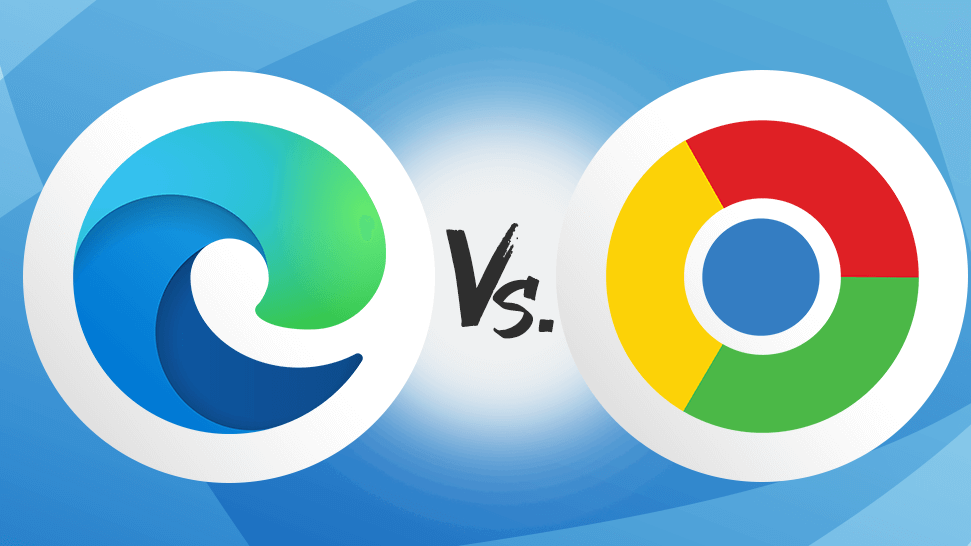Selecting your new computer was challenging enough. Now, you also have to decide what software you will use, with the Internet browser being the most important piece. When will the decisions end? At least we’re making the comparison easier. This article helps you decide if Google Chrome or Microsoft Edge works best for you.
It’s estimated that the average individual spends almost a third of their day online. That means you likely already have a go-to browser. It may be the one that was pre-loaded on your computer when you bought it or the same one you’re using on your mobile devices, but those aren’t the best reasons to select a browser. Keep reading to learn the key features of Google Chrome and Microsoft Edge.
Google Chrome vs. Microsoft Edge: The Basics
Google Chrome is today’s most popular browser worldwide. It has been around since 2008 when it was released to compete with Internet Explorer and Mozilla Firefox. At that time, Internet Explorer was the big-shot browser, but within a few years, Google had taken the title.
Internet Explorer was still a part of Microsoft Windows, but very few people actually used it. A common joke was that its only purpose was to download another browser, such as Firefox, Chrome, or Opera. Or you could have used Microsoft Edge which has been a part of Windows 10 since 2015.
Microsoft finally killed Internet Explorer with one of the recent updates to Windows 10. If you get a new computer now (with either Windows 10 or 11), you won't even see the Internet Explorer icon anywhere.
Chrome and Edge are available for Windows, macOS, Android, and iOS devices. They are both based on the open-source software, Chromium. Still, Edge has a long way to go before it will reign supreme. In 2022, Chrome still has almost a 60% market share. Safari (which all Macs have) comes second at almost 10%, Firefox at 11%, and Edge fourth, approaching 10%
The two are not dramatically different. After all, they are competitors, so any big gap is quickly filled. Still, there are differences. Let’s discuss those next.
User Interface
Both Chrome and Edge allow you to have multiple windows open at the same time. Edge allows you to switch your tabs from horizontal (like Chrome) to vertical. You can group tabs by choosing a name and colour for related tabs on both. Your tabs will sync with your mobile devices, but where the tabs appear on the screen will be different in Edge or Chrome mobile.
You can also bookmark (Chrome) or favourite (Edge) your pages. Edge allows you to create Collections of favourites. You can send those to Microsoft Docs, Excel, OneDrive, or Pinterest. Meanwhile, Chrome has a similar feature, and its collections can be shared with other Google account users.
You can sync your bookmarks and passwords to multiple devices but doing so requires getting a Google or Microsoft account.
If you want to choose the look of your browser (e.g. a theme or Dark Mode), there’s more flexibility with Chrome. Edge allows you to make choices from 14 themes in its Appearance settings. Otherwise, you’ll have to go to the Microsoft Edge Store.
Both browsers offer private browsing. Your default search engine will depend on your browser choice, though: Chrome uses Google to search (surprise!), whereas Microsoft defaults to Bing. However, you can easily change the search engine to Google - which we highly recommend!
One standout feature of Edge is its immersive reader. This allows you to look at a page as if you are reading it on an ebook. It’s part of the basic Edge browser tools, but you’d have to add it as an extension if you wanted this in Chrome.
Need for Speed
If performance is important, you’ll want to know that Edge runs faster. There are competing claims, but we found Edge runs faster than both Chrome and Firefox. Chrome also uses more RAM, meaning you'll need a more powerful computer to keep all those tabs open.
Security
Security and privacy are other big areas to consider when picking your browser. Browsers are common malware targets. You’ll want a browser that provides you with security features. Both Chrome and Edge do help you out, but if security and privacy are your top priority, look at Firefox, Tor, or Brave instead.
Still, since we’re comparing Chrome and Edge, let's talk about their security tools. Chrome allows you to send “do not track” requests to websites. Whether these are actually helpful is up for debate - after all, Google makes money by tracking what you do online and then serving you ads!
Edge allows you to be more selective. Users choose between three tracking-prevention levels and get a blocked tracker list.
Both browsers have built-in anti-malware and phishing protection, but Google is known for updating more regularly, which can keep you safer online.
Addons and Extensions
Both browsers allow you to add extra functionality by adding extensions. Since they are based on the same Chromium engine, the addons will be compatible with both. Our favourite addons are LastPass (for managing passwords) and uBlock Origin (for blocking ads).
Key Takeaway
Microsoft has been steadily closing the gap between its Edge offering and Chrome. For speed and resource consumption, Edge is claiming the lead. Of course, these are only two of the available browsers out there.







